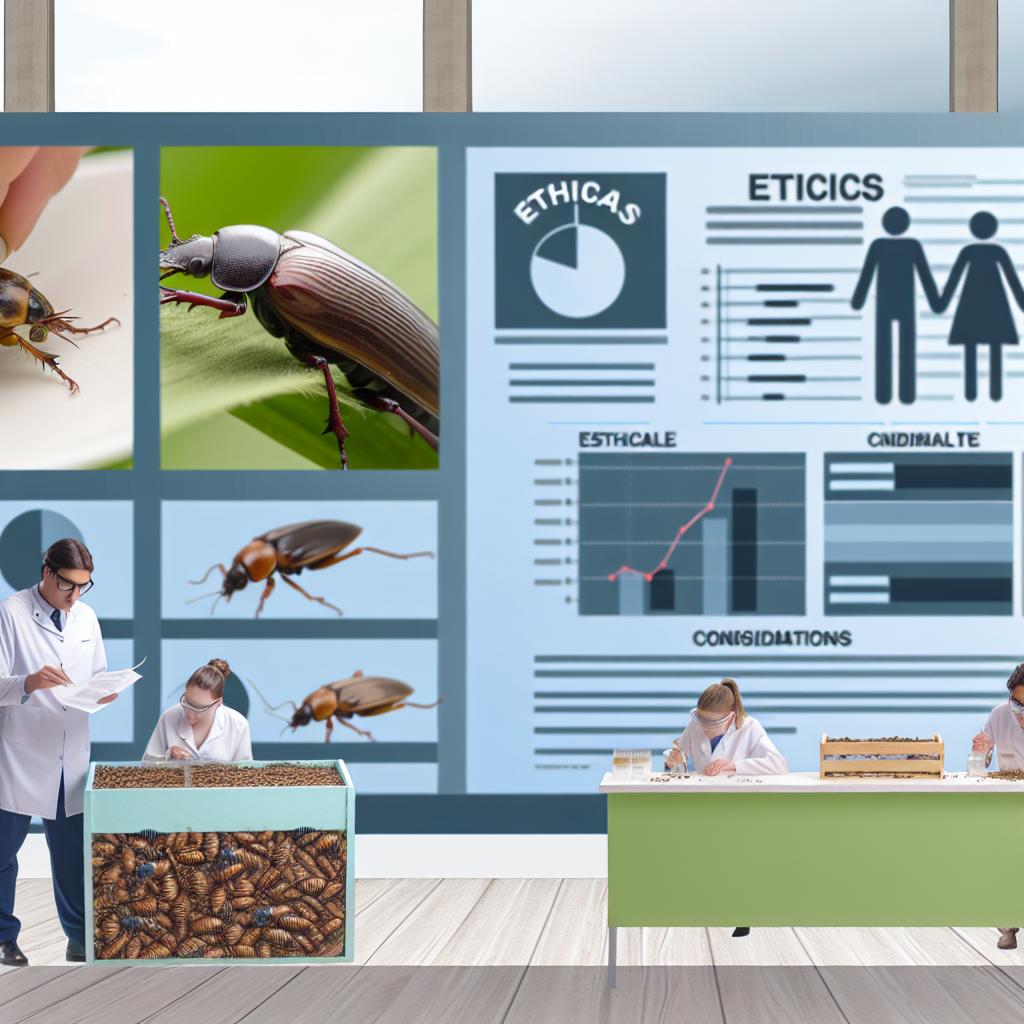Introduction to Insect Farming
Farming insects for human and animal consumption is an emerging industry that promises numerous environmental and economic benefits. However, it also raises several ethical questions that require careful consideration. This discussion explores these concerns, weighing the pros and cons of insect farming from an ethical standpoint.
Sustainability and Environmental Impact
One of the primary arguments in favor of insect farming is its potential to contribute to sustainable food production. Insects require significantly less land, water, and feed compared to traditional livestock. This makes them a more environmentally friendly option, as they produce fewer greenhouse gases and help preserve natural habitats. This aspect becomes particularly crucial as the global population continues to rise, leading to increased demand for food and resources. Traditional livestock farming, such as beef production, is known to be resource-intensive and a significant source of methane emissions, a potent greenhouse gas. In contrast, insect farming offers a viable alternative with a reduced carbon footprint.
From a waste perspective, the ability of insects to feed on organic waste and byproducts from other agricultural processes presents another ecological advantage. This allows for a form of circular economy, where waste is converted into valuable protein sources, thus reducing the burden on waste management systems.
Conversely, the large-scale farming of insects necessitates energy consumption and resource management. Critics argue that without strict regulations, insect farming could lead to ecological imbalances. The introduction of non-native species for farming purposes, if managed carelessly, could threaten local ecosystems. Therefore, it is crucial for the industry to implement sustainable practices that mitigate these risks. Developing energy-efficient insect farming systems and ensuring the use of locally adapted insect species where possible can minimize potential adverse effects on the environment.
Animal Welfare Concerns
The welfare of insects in farming environments is a contentious issue. Insects, although vastly different from mammals, are sentient beings. This raises questions about their capacity to experience pain and their treatment in farming facilities. While insects lack a central nervous system similar to vertebrates, they do possess complex nervous systems capable of reacting to stimuli. Thus, ensuring humane conditions, such as appropriate space, temperature, and food, should be a priority for ethical farming practices.
Research into insect sentience is still in its infancy. Currently, scientists are working to understand the extent of consciousness and pain perception in insects. Until more definitive conclusions are drawn, it remains essential for industry stakeholders to err on the side of caution and prioritize the ethical treatment of farmed insects. Establishing industry standards that address these issues could aid in promoting transparency and consumer trust.
The debate over insect welfare also underscores the importance of further scientific inquiry. As more evidence surfaces regarding the nature of insect consciousness and the implications for their treatment, it is likely to influence public opinion and regulatory frameworks surrounding insect farming practices.
Cultural and Societal Implications
The perception of insects as food varies significantly across cultures. In some societies, consuming insects is a long-standing tradition, whereas, in others, it is viewed with skepticism or disgust. This diversity in perspectives highlights the need for culturally sensitive approaches to the promotion and marketing of insect-based foods. In regions where insect consumption is not culturally accepted, education and awareness campaigns can highlight the environmental benefits and nutritional value of insects. This might slowly alter perceptions while respecting traditional dietary customs.
Furthermore, the shift towards insect farming has economic implications. It may provide new opportunities for farmers but could also disrupt traditional agricultural sectors. Farmers specializing in conventional livestock may face challenges if consumer demand shifts towards insect-based products. A balanced approach is necessary to ensure equitable transitions for those affected. This could involve offering training and resources to support farmers willing to adapt to insect farming, thereby providing pathways for diversifying agricultural practices.
The economic landscape will also see changes in terms of job creation and industry growth in regions that adopt insect farming. A well-developed insect farming sector can stimulate local economies through the creation of new supply chains, from farming to processing, distribution, and retail.
Conclusion
The ethical considerations of insect farming are multifaceted, encompassing environmental, welfare, and cultural dimensions. Proponents argue for the industry’s potential in supporting sustainable agriculture, while critics urge caution regarding welfare and ecological impacts. The ongoing research will play a crucial role in addressing these concerns as new insights emerge about the potential and limitations of insect farming.
Transparency in farming practices, including clear labeling of insect-based products, is vital for maintaining consumer trust and facilitating informed choices. As the industry grows, it is important that policymakers, scientists, and industry leaders engage in meaningful dialogues to craft regulations that safeguard environmental sustainability, ensure ethical treatment of insects, and respect cultural differences.
Developing resilient insect farming technologies and systems that align with local conditions can further mitigate negative impacts and promote ecological balance. Additionally, embracing cultural diversity in food production and consumption will enhance the acceptance and success of insect-derived products in global markets.
As we advance, engaging in informed and balanced discussions about these ethical concerns will help shape responsible and sustainable practices in this burgeoning industry. This will ensure that insect farming not only meets the protein needs of a growing population but does so in a manner that is environmentally sound, culturally aware, and ethically responsible.

